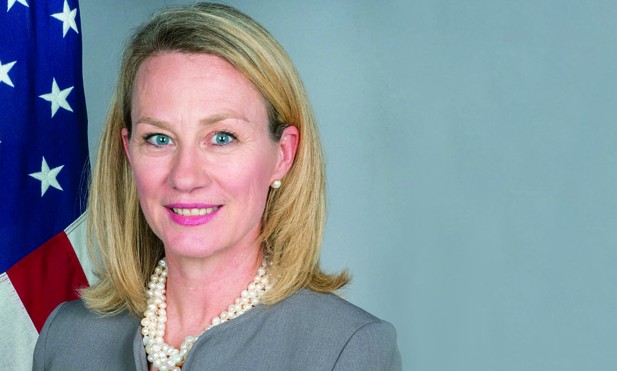Speaking at a Master’s Tea in Timothy Dwight College on Tuesday, U.S. Ambassador to Jordan Alice Wells stressed the gravity of the threat posed by the Islamic State and the importance of tolerant, modern Arab states like Jordan in combating that threat.
Her talk offered a broad overview of the conditions in the Middle East that precipitated the rise of the Islamic State (Daesh) and highlighted the complexities of combatting a group that has shown a capacity to adapt and respond to Western strategy. In particular she highlighted the Islamic State’s increased success over its jihadist rival Al-Qaeda in radicalizing youth and drawing them to Iraq and Syria.
“Daesh has been able to surge to the forefront [of this competition] because of its unbelievable mastery of propaganda,” Wells said. “Daesh has succeeded in forming a brand.”
She stressed that defeating ISIL was going to require significant investment dedicated to winning the ideological battle. When considering a vision that could go toe to toe with the ISIL propaganda machine, the United States should look to Jordan, she argued.
“We have allies who we can work with to create that vision, namely Jordan” she said. “Jordan’s vision and promise is the greatest threat to Daesh.”
Ambassador Wells cited Jordan’s protection and celebration of religious minority groups like Christians, its acceptance of over 600,000 Syrian refugees, and King Abdullah II’s clear stance that the Islamic State does not represent Islam, as well as the fact that Jordan has flown 300 sorties in Iraq and Syria as clear indicators of Jordan’s key role in the region.
However, she conceded that significant challenges remain. College graduates in Jordan can often not find a job and the youth unemployment rate sits above 35%. Meanwhile, thousands of Jordanians fight in the ranks of the Islamic State and Jahbat al-Nusra. She also stressed that Jordan must monitor and combat creeping conservatism; the path forward must lie in reforms.
Despite the importance of the ideological battle, she added that significant military force would be required to defeat the group, both in terms of American air power and local forces on the ground. However, she made clear that she does not believe the U.S. should significantly increase the scope of its military mission to become a large-scale boots on the ground operation.
While Ambassador Wells stressed the difficulty of the challenge that defeating ISIL and similar extremist groups presents, she managed to finish her talk on an optimistic note.
“I am convinced that Daesh and other extremist groups are doomed to fail.”

